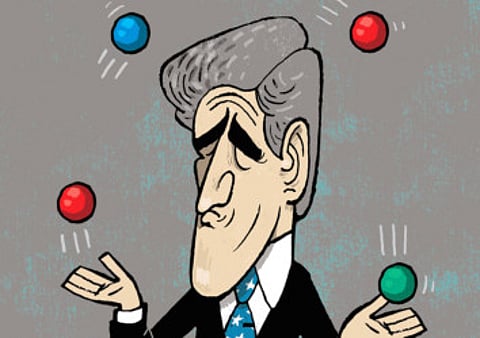Like it or not, John Kerry is the only game in town
Iran wants sanctions lifted, seeks to normalise ties with the West and wants its regional position recognised

John Kerry “the Juggler”, is quite fit a description to clearly define the role currently undertaken by US Secretary of States in the region. It is very rare in the recent history of US global diplomacy to see an American secretary of states physically dealing almost simultaneously with multiple highly explosive regional issues: Geneva II over Syria, Iran nuclear build-up, the long-aching Palestine/Israel problem and stability and security in both Iraq and Afghanistan.
Officials in almost all Arab countries anxiously look, and rightly so, at Kerry’s movements and statements as events in the Middle East keep unstoppably unfolding. The concerns over these events go far beyond the region as their implications, on the one hand, will affect many countries the world over. On the other hand, these developments are deeply disturbing as they are of earth-moving nature and not dissimilar to developments of post-1916. After the fall of the Ottoman Empire in the First World War, an agreement had been secretly reached between the victors, Britain and France, redrawing the Middle East map in its current shape.
This agreement contradicted an earlier one, “McMahon Agreement” of 1915, plus a pledge made to the Arab leaders at that time by TE Lawrence in which Britain promised to allow the Arabs to run their own affairs, in return to help western Allies in defeating the Turks. The Arabs realised a year later, that they were cheated and back-stabbed by the Allies when they discovered in November 1917, and completely by mistake, through the new Bolshevik leadership in Moscow, a copy of 1916 agreement. The copy was found in the pre-Communist Russian government’s archive. Russia, according to the agreement, was to have influence in Turkish Armenia and northern Kurdistan, which explains why the Russians had a copy.
Putting secrecy aside, almost every detail now is openly unfolding and it seems we are about to witness colossal changes in the region on 1916 scale. Many likely realities in the pipeline related to Syria, Palestine and Iran are openly discussed. But sadly quite few geographical and demographic changes have been, for decades, forcibly taken place in Israeli-occupied territories in both Palestine and Syria, illegally confiscating land or uprooting entire families from their birth place to make space for Jewish colonists.
However, the talks over Iran’s nuclear issue and the gradual lifting of economic sanctions against Tehran are due to resume next week between the five permanent security council members plus Germany (P5+1). This will move the talks a step further into its final stage in four months. Of course it is too early to predict whether these talks will eventually deliver the right climate for a serious and genuine understanding and mend the much troubled relations between the West and Iran. It is not easy, but the talks carry the potential of not only changing the status quo of the last three decades, but also establishing a new regional order sponsored and supported by the big P5+1 with Russia’s approval.
Painful instability
As some Arab countries, especially in the Gulf region, may rightly get suspicious by these movements, the course of events in the next few weeks and months won’t be altered unless by the use of force. This option is obviously not available and even if it is, it may very likely achieve the opposite results and lead to uglier killings and human misery. The regional powers must understand that both the US and Iran could be possibly on the verge of reaching an understanding to begin building new relations. Such an understanding to which Russia is expected to be part of, should be made absolutely transparent in its scope and objectives, unlike the Anglo-Franco secretive agreement of 1916.
Many regional political figures and local big businesses believe the region cannot, and does not want to face such burdens any more if the many crises in the area remain unresolved. They point out to the painful and costly instability in the region for at least more than four decades. The mutual hostility between the US and Iran has brought to the region and beyond, since 1979, huge, disastrous economic consequences and colossal human losses. That was almost immediately followed by the eight-year senseless, but deadly Iran-Iraq war which ended in exhaustion in 1988, and shortly followed by the equally disastrous Iraqi invasion of Kuwait in 1990.
Now the killing fields in Syria are seriously threatening the neighbouring regions with the illegal presence of the Iranian-sponsored Hezbollah militants and Al Qaida-linked forces in Syria’s territories. Iran wants sanctions lifted, seeks to normalise its relations with the West and wants its regional position recognised. In return, the western allies want to maintain stability and security in, and complete their withdrawal from, both Iraq and Afghanistan. They also look to Iran accepting the eventual phasing out of Bashar Al Assad’s regime in Damascus and pulling Hezbollah forces back to Lebanon. This makes Kerry’s jugglery in the region more vital than any time in the past.
Mustapha Karkouti is a former president of the Foreign Press Association, London.


